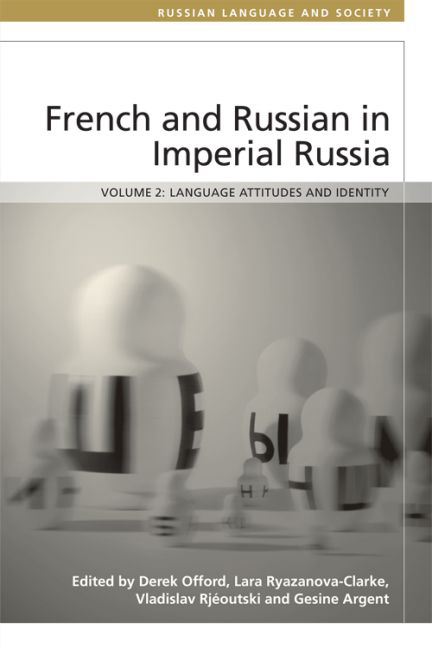Book contents
- Frontmatter
- Contents
- Preface
- Note on Dates, Transliteration and Other Editorial Practices
- Abbreviations Used in the Text, Notes and References
- Dates of Reigns in Eighteenth- and Nineteenth-Century Russia
- Dedication
- Introduction
- 1 The Pan-European Justification of a Multilingual Russian Society in the Late Eighteenth Century
- 2 Princess Dashkova and the Politics of Language in Eighteenth-Century Russia
- 3 Plating ‘Russian Gold’ with ‘French Copper’: Aleksandr Sumarokov and Eighteenth-Century Franco-Russian Translation
- 4 Francophone Culture in Russia Seen through the Russian and French Periodical Press
- 5 Linguistic Gallophobia in Russian Comedy
- 6 The Linguistic Debate between Karamzin and Shishkov: Evaluating Russian–French Language Contact
- 7 Language and Conservative Politics in Alexandrine Russia
- 8 Seduction, Subterfuge, Subversion: Ivan Krylov's Rewriting of Molière
- 9 The French Language of Fashion in Early Nineteenth-Century Russia
- 10 Russian ‘Translations’ of Patrie in the Napoleonic Period
- 11 Treatment of Francophonie in Pushkin's Prose Fiction
- 12 Love à la mode: Russian Words and French Sources
- Conclusion
- Notes on contributors
- Index
Preface
Published online by Cambridge University Press: 25 October 2017
- Frontmatter
- Contents
- Preface
- Note on Dates, Transliteration and Other Editorial Practices
- Abbreviations Used in the Text, Notes and References
- Dates of Reigns in Eighteenth- and Nineteenth-Century Russia
- Dedication
- Introduction
- 1 The Pan-European Justification of a Multilingual Russian Society in the Late Eighteenth Century
- 2 Princess Dashkova and the Politics of Language in Eighteenth-Century Russia
- 3 Plating ‘Russian Gold’ with ‘French Copper’: Aleksandr Sumarokov and Eighteenth-Century Franco-Russian Translation
- 4 Francophone Culture in Russia Seen through the Russian and French Periodical Press
- 5 Linguistic Gallophobia in Russian Comedy
- 6 The Linguistic Debate between Karamzin and Shishkov: Evaluating Russian–French Language Contact
- 7 Language and Conservative Politics in Alexandrine Russia
- 8 Seduction, Subterfuge, Subversion: Ivan Krylov's Rewriting of Molière
- 9 The French Language of Fashion in Early Nineteenth-Century Russia
- 10 Russian ‘Translations’ of Patrie in the Napoleonic Period
- 11 Treatment of Francophonie in Pushkin's Prose Fiction
- 12 Love à la mode: Russian Words and French Sources
- Conclusion
- Notes on contributors
- Index
Summary
The book we introduce here is the second of two volumes that concern an aspect of the social, cultural and political history of language in Imperial Russia, focusing on the period from the Enlightenment to the age of Pushkin. The volumes deal with the profound impact which the French language and the culture that it bore had on Russian high society and on the consciousness of the social and literary elite in the second half of the eighteenth century and the first half of the nineteenth, when French was an international language among such elites in the European world. They explore the coexistence, competition and commingling of the two languages and the possible benefits and allegedly detrimental effects of Franco-Russian bilingualism.
The two volumes are closely tied together in approach as well as subject-matter. They are conceived as original contributions to the multidisciplinary study of language. They address, from a historical viewpoint, subjects of interest to sociolinguists (especially language use and language choice, bilingualism and multilingualism, code-switching and language attitudes). At the same time, much of their subject-matter (social and national identity, nationalism, linguistic and cultural borrowing) falls within the purview of social, political and cultural historians, or of Slavists (who have an interest in the relationship between Russian and Western culture and debate about it) or of students of the European Enlightenment, Neo-Classicism and Romanticism.
The volumes share a main title, French and Russian in Imperial Russia, and are conceived as complementary to one another, but their focus is different and each is intended to be capable of standing on its own. The first volume, sub-titled Language Use among the Russian Elite, examines the functions of French in Russia in various spheres, domains and genres in the period in question and the interplay and intermixing of French and Russian. It also provides some examples of French lexical influence on Russian. It is concerned primarily with linguistic practice. The second volume, sub-titled Language Attitudes and Identity, investigates the effects of the use of French and analyses Russian perceptions of the phenomenon of elite bilingualism. It explores Russian literary and intellectual resistance to francophonie and its role in the formation of social, political and cultural identity as Russia began to flourish as an imperial state in the eighteenth century and as a form of cultural nationalism came into being there in the nineteenth.
- Type
- Chapter
- Information
- French and Russian in Imperial RussiaLanguage Attitudes and Identity, pp. vii - xPublisher: Edinburgh University PressPrint publication year: 2015

